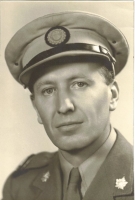
Year Born: 1902
Year Died: 1956
Pioneer
Halton, Matthew (1902-1956)
“This is Matthew Halton of the CBC”. While Matthew Halton’s broadcasting career was remarkably short, a matter of some twelve years, his voice, his personality and his consummate skills as a journalist and reporter made him one of Canada’s best-known and most respected broadcasters. As Senior War Correspondent for the CBC from 1943 to 1945 during World War II, Matthew reported from the Italian and Northwest Europe war zones for CBC radio, and became, as his son David later said of him, “the voice of Canada at war.”
Matthew Henry Halton was born in Pincher Creek, Alberta, on September 7th 1904. On leaving high school, he attended Calgary Normal School, the first teachers’ college in Alberta, and taught for some years before going to the University of Alberta, where he gained journalistic experience as reporter and later editor of the university newspaper. On graduating with a BA in 1929, he took advantage of an I.O.D.E. scholarship to go to London, England, to study first at King’s College and then at the London School of Economics. During his three years in England, he wrote over 200 stories and articles for various Canadian newspapers.
On returning to Canada in 1931, he joined the Toronto Star as a reporter, and in the following year he was sent back to London as the paper’s London correspondent, responsible for covering social and political events across Europe. In this role he filed many stories about the rise of Nazism in Germany, as well as covering the Spanish Civil War (1936-39) and the Russo-Finnish War (1939-40). His voice was first heard on radio when he was asked to file reports for the CBC during the Munich crisis
Reassigned by the Star to Washington in July 1940, Matthew, by now known to his associates as Matt, was a war correspondent again within a year, this time covering the war in North Africa. It was during this time that his voice began to be heard regularly on Canadian radio, filing reports for the CBC on the exploits of the ‘Desert Rats’ of the British Army. Back in Canada in 1942, Matthew took a time out to write a book, Ten Years to Alamein, about his experiences as a war correspondent.
In 1943, he was hired by the CBC to be their Senior War Correspondent, and assigned to the CBC Overseas Unit in London. In this role, he covered all the major war events of the next two years, including the invasions of Sicily, Italy and Northwest Europe – where he filed reports from the D-Day beaches, as well as covering the ensuing grinding progress of Allied forces as they pushed the enemy back across France, Belgium and Holland and into Germany itself. His final reports from that front were from Berlin on VE Day, May 8th 1945.
Matt’s choice of words in his reports, and the dramatic and almost poetic style with which he delivered them, struck a uniquely responsive chord in the ears of all Canadians who listened to him on the CBC, and brought home to them the stark realities of the drama which was unfolding before his eyes. For his unparalleled work as a war correspondent he was made an Officer of the Order of the British Empire in 1945.
Matt stayed on in London after the war as the CBC’s senior foreign correspondent, contributing British, European and African stories to many radio programs, including Capital Report, News Round-Up and Report on Britain. The BBC also used him on several British radio series. For the CBC he covered both the funeral of King George VI and the Coronation of Queen Elizabeth II. He proved as adept at reporting on British elections and political clashes between continental countries as he had been in bringing the war home to Canadian listeners. His travels took him all across Europe in pursuit of stories; in 1954 he covered the Summit Conference in Geneva, and in 1955 Matthew was out on the Gold Coast of Africa, producing a radio documentary for the CBC.
In 1956 Matthew Halton received an Honorary Doctorate from the University of Alberta. Later that year, after having had stomach surgery some months earlier, he died in a London hospital on December 3rd.
A History Television documentary on Matt’s life, broadcast in January 2002, estimated that he had written over four million words in his career: “….words that shaped the views of a nation and set an unparalleled standard of excellence for future generations of foreign correspondents.”
In 1982, he was posthumously elected to the Canadian News Hall of Fame. His son David, who was only sixteen when his father died, was later to become the CBC’s Chief Political Correspondent.
Written by Pip Wedge – April, 2006
